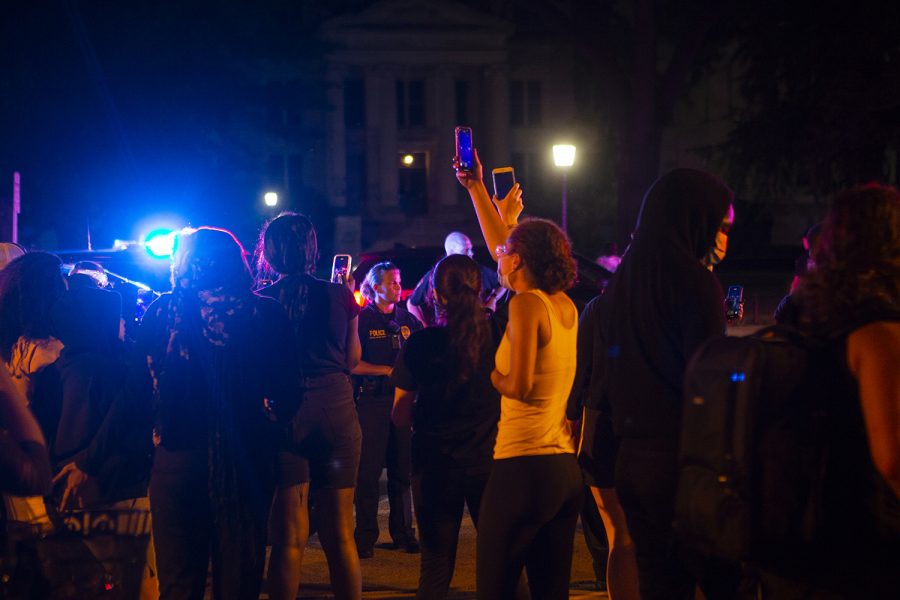Opinion | Iowa protest bill stifles free speech and assembly through harsh penalties
SF 534 increases penalties for protest related charges. Though proponents claim it will protect law enforcement and prevent destruction of property, its real blow is to the First Amendment.
Protesters demonstrate on June 5, 2020.
March 15, 2021
A bill that would increase penalties for protest-related charges passed the Iowa Senate on March 10 along party lines. Reacting to this summer’s protests, the bill does not explicitly infringe on First Amendment rights, but it makes it much more difficult for Iowans to safely exercise their right to protest.
Now in the House Public Safety committee, SF 534 (formerly SF 497) covers everything from vehicle-related accidents to aiming laser pointers in people’s faces — all in an attempt to crack down on protesters following this summer’s demonstrations.
The bill is largely based on Iowa Gov. Kim Reynolds’ “Back the Blue” proposal, which faced opposition from the ACLU of Iowa, among other groups.
In short, the bill draws wider bounds for what is considered an unlawful assembly or riot, lowers the requirements for involvement in these assemblies, increases sanctions for protesters, and defines additional criminal acts.
Any gathering of three or more people can be deemed unlawful even if just one person acts in a violent manner and intends to commit a public offense. Similarly, a gathering can be deemed a riot if the group disturbs others and just one of them intends to use force against another person or cause property damage.
That means that an entire protest could be condemned because of one bad actor, or because of police-instigated violence.
The government, though bound by citizens’ First Amendment rights to speech and assembly, has a vested interest in declaring protests against the state unlawful assemblies. With this bill, peaceful protesters with legitimate concerns could be more easily arrested and charged, and their voices stifled.
Under some of the bill’s most expansive provisions, a person could be charged with an aggravated misdemeanor if they engage in disorderly conduct — by making loud noise near a public or residential building, for example — while merely present during a gathering deemed unlawful. If the gathering is deemed a riot, the charge could increase to a class D felony.
This, among the bill’s other stringent sanctions, could put peaceful protesters in jeopardy should a gathering they attend, through no action of their own, later be deemed unlawful. Similarly, the term “present” could be broadly construed to mean “in the vicinity of,” and could implicate onlookers nearby.
The bill also increases sanctions for property damage and stipulates that any acts that “damage, deface, alter, or destroy any publicly owned property” constitute a class D felony.
Though we would hope that police and prosecutors would exercise discretion in arrests and charges, this summer’s protests have shown differently. Given their track record, I don’t have much faith in their judgement.
Iowa recently made national headlines for the arrest and subsequent prosecution of Andrea Sahouri, a Des Moines Register reporter who was covering a racial justice protest on May 31. Though she was acquitted of two misdemeanor charges, the fact she was arrested and prosecuted at all casts doubt on Iowa officials’ capacity for rational discretion.
This bill, combined with high-profile cases like Sahouri’s, serves to discourage people from using their First Amendment rights. It creates unreasonably harsh penalties designed to intimidate Iowa residents and prevent them from taking part in protests.
The provisions of the bill are much too broad and the penalties much too harsh. If this was really about protecting the safety of law enforcement officers or preventing destruction of property, as the bill’s proponents claim, it would be more focused.
Instead, SF 534 makes it far too easy to arrest and charge protesters for crimes with unduly harsh penalties and limits Iowans’ First Amendment rights.
Columns reflect the opinions of the authors and are not necessarily those of the Editorial Board, The Daily Iowan, or other organizations in which the author may be involved.

















